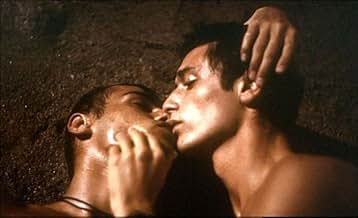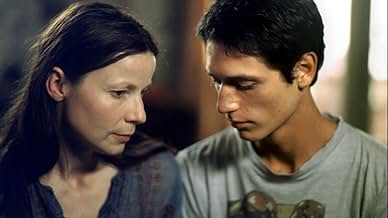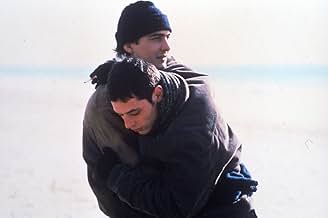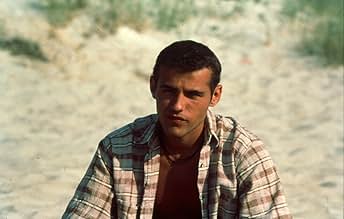Presque rien
Mathieu, 18 ans, passe l'été dans la maison d'été de sa mère, en Bretagne. Sur la plage, il rencontre Cédric, un garçon de son âge. Une histoire d'amour commence entre les deux garçons.Mathieu, 18 ans, passe l'été dans la maison d'été de sa mère, en Bretagne. Sur la plage, il rencontre Cédric, un garçon de son âge. Une histoire d'amour commence entre les deux garçons.Mathieu, 18 ans, passe l'été dans la maison d'été de sa mère, en Bretagne. Sur la plage, il rencontre Cédric, un garçon de son âge. Une histoire d'amour commence entre les deux garçons.
- Réalisation
- Scénario
- Casting principal
- Récompenses
- 1 nomination au total
- Mathieu
- (as Jeremie Elkaïm)
- Cédric
- (as Stephane Rideau)
- La psychiatre
- (as Rejane Kerdaffrec)
Avis à la une
Director Sebastien Lifshitz slices the narrative, then pieces it together in a way which is at first confusing but which ultimately adds much to the emotional tone of the film. The meeting and parting of two boys in their late teens is related without offering much in the way of a clear explanation as to how or why. The emphasis being on the troubled emotional journey one of them undergoes as a result of the unexpected love relationship that develops.
Besides his keen cinematic eye, Lifshitz's major success is eliciting from both Jeremie Elkaim and Stephane Rideau totally convincing performances. There's not one false note sounded. The smaller parts too are handled well.
A deeply moving, beautifully played, complex film. One that certainly warrants more than one viewing.
If you haven't seen the film, perhaps you would like to stop reading.
Sebastien Lifshitz, the director of the film, has told his story from Mathieu's viewpoint. Most viewers appear to be disoriented by the different times within the film, but there are hints that are not obvious, as one can see, in retrospect. The story is told in flashbacks that might add to the way some people will view the film. This is a story about the doomed the love Mathieu felt for Cedric and the ultimate breakdown of their life together.
First of all, Cedric, the handsome young local, pursues Mathieu until he succeeds in convincing him he likes him. Mathieu feels the attraction for Cedric too. We realize how different both young men are by the way Cedric tells Mathieu's family how he feels school is not for him. On the other hand, Mathieu, who wants to be an architect, finds beauty in the abandoned place where Cedric has taken him. We watch as Mathieu, reading from the guide book, wants Cedric's attention.
When Mathieu comes out to his mother, she wisely tells him about the importance of continuing his career. She also points out about what future both of them would have together, which proves to be true. Mathieu appears to have learned his lesson, the hard way. He goes on to an uncertain life with Cedric and attempts to take his own life. We watch him in the hospital speaking to a psychiatrist that has treated his wounded soul.
The ending might be confusing for most viewers, but there is a moment in the film when Mathieu goes to work in a bar where we see him washing glasses and looking intently to Pierre, the young man who frequents the bar. That is why when Mathieu goes looking for Pierre at his house, appears to be hard to imagine. Yet, we have seen the way Mathieu is obviously interested in Pierre. The last scene at the beach, when Pierre and Mathieu are seen strolling in the sand, has a hopeful sign that things will be better between them as they watch a young boy, apparently lost, but then realizing the father is nearby.
Jeremie Elkaim makes Mathieu one of the most complex characters in recent films. This is a young man who is hard to understand on a simple level. Mathieu has suffered a lot, first with the separation of his parents, then with his depressed mother and with losing Cedric. Stephan Rideau, who has been seen on other important French films, is equally good, as the shallow Cedric.
While "Come Undone" will divide opinions, the film deserves a viewing because of the complexity and the care Sebastien Lifshitz gives to the story.
The film's fractured narrative -- which is comprised of lengthy flash-backs, bits and pieces of the present, and real-time forward-movement into the future -- is a little daunting. Director Sebastien Lifshitz doesn't signal which time-period we are in, and the story line can be difficult to follow. But stick it out: The film's final 45 minutes are so engrossing that you won't be able to take your eyes off the screen. By turns heart-breaking and uplifting, this film ranks with "Beautiful Thing" as must-see cinema.
Told by director Sebastian Lifshitz and writers Stephane Bouquet and Lifshitz through a series of vignettes--often presented in a nonsequential timeline--the unfoldment provides some work on the part of the viewer to position these disjointed fragments together.
However, the basic scenario is so simple that the unfoldment does unite in post-reflection. It is an interesting tale, made plausible by two fine performances by the leads.
Jeremie Elkaim as Matthiew evokes a slightly moody, troubled youth, longing for affection, and willing to give of himself in a new relationship. Elkaim's work beautifully conveys Matthiew's need for companionship and for escape from a staid and mundane domestic environment.
Stephane Rideau presents yet another of his remarkable performances as Cedric. Rideau immerses himself in the role so skillfully that his craft brilliance is taken for granted. As close to the late James Dean as has been seen recently, Rideau takes his place in the Alain Delon legacy as one of France's leading young actors. Rideau possesses an arresting countenance: even his pointed ears, protruding chin, an off-centered eye, and crooked lips seem to contribute to his handsomeness. His Cedric is non-intellectual, expressing primitive emotions in his approach to life; yet, his ardor for Matthiew rings undeniably genuine and true.
The rest of the cast of "Presque rien" contribute to this slice-of-life tale, and we are pleased to have an opportunity to glimpse fragments of a both playful and poignant summertime romance.
Le saviez-vous
- AnecdotesJérémie Elkaïm was 21 years old and Stéphane Rideau was 23 years old when they played the teenagers 'Mathieu' and 'Cédric'. Elkaïm would later play yet another gay teenage character in the series 'À cause d'un garçon (2002)' and Rideau would play the aging hustler 'Vassili' in 'Notre paradis (2011)'.
- Citations
Cédric: [at the beach] Hey, Mathieu.
Mathieu: Please go away.
Cédric: Why?
Mathieu: So they don't see us together.
Cédric: Are you ashamed or what?
Mathieu: No, I just don't want any trouble.
Cédric: What trouble?
Mathieu: Can't you just leave?
Cédric: You think I'm stupid?
Mathieu: Just fuck off!
Cédric: What, fuck off?
- Bandes originalesWise Mans Blues
Written by Perry Blake and Glenn Garrett
Performed by Perry Blake
From Perry Blake's album "Still Life"
Courtesy of Sony - ATV Music Publishing France
Meilleurs choix
- How long is Come Undone?Alimenté par Alexa
Détails
Box-office
- Montant brut aux États-Unis et au Canada
- 326 484 $US
- Montant brut mondial
- 326 484 $US
- Durée
- 1h 40min(100 min)
- Couleur
- Mixage
- Rapport de forme
- 1.85 : 1























